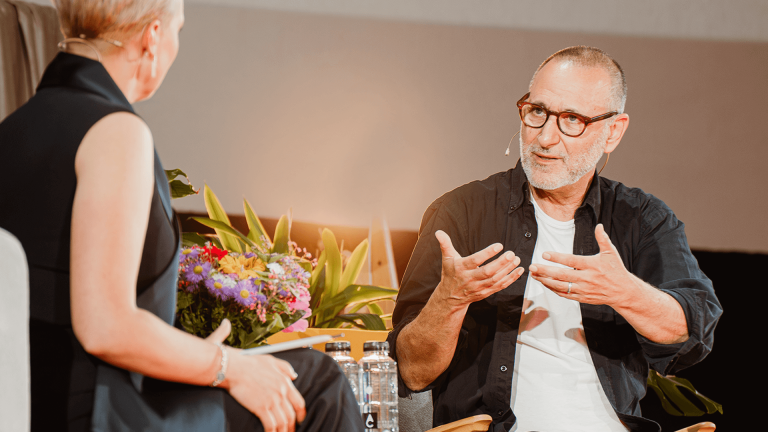



One of the most beloved speakers at The Inner – Mapping Inside 2024, David Bedrick, JD, JD, Dipl.
PW, is a renowned teacher, counselor and advocate with extensive experience in education and counseling.
He has served on the faculty of the University of Phoenix and the Process Work Institute in the US and Poland.
He is also the founder of the Santa Fe Institute for Shame-Based Studies, where he devotes his time offering classes to enhance the skills of therapists and psychologists, guiding them in exploring and overcoming shame.
According to David, shame is an intrinsic view of self, it is more than an emotion.
Shame manifests itself in every aspect of our lives, including our professional environment.
In this interview, David shares valuable insights on how shame can be identified in the organizational environment, its impact on employees and leaders, and offers practical strategies for creating a healthier and “shame-free” work environment.
We discuss the importance of self-acceptance, the role of diversity and inclusion, and how we can encourage the expression of vulnerabilities and failures in organizations.
David, you often talk about the pervasive nature of shame in various aspects of our lives.
How does shame uniquely manifest itself in professional settings and what are some of the common triggers of shame among employees and leaders?
Professional environments have their own norms.
Some of these norms are explicit (e.g. “Employees and bosses/managers cannot have romantic relationships”) and some are implicit, unexplained (e.g. “It is not okay to talk back to superiors” or “Strong emotions, especially anger, are not appropriate in the workplace”).
These implicit norms lead to feelings and conflicts being repressed – they become ‘underground’, hidden and shrouded in shame.
The shame is part of the external culture and then becomes internalized.
The result is that these expressions are manipulated and silenced.
In many professional environments, there is a strong emphasis on performance, competition and success.
How do these cultural elements contribute to the experience of shame among employees and what are the consequences for both the individual and the organization?
In many professional environments, the focus on performance, competition and success inevitably marginalizes other values – collaboration, self-care, relational well-being.
Marginalization creates symptoms, including relationship conflict, burnout and illness.
Because these symptoms are not clearly linked to the values of the organization, people will hide them – otherwise they will be stigmatized and it will be seen as “there is clearly something wrong with them” rather than as responses to an unhealthy or biased organizational system.
Can you share some strategies or practices that organizations can implement to create a more supportive and “shameless” work environment?
How can leaders foster a culture where employees feel safe to express their vulnerabilities and failures?
Perhaps the most important strategy for eliminating shame in organizations is to create safe spaces for people to discuss “forbidden” experiences, behaviors, and feelings. For example, there need to be spaces for people, especially women, to talk about sexual abuse and assault. People need to be free to express real feedback to people at higher levels in the organization. A useful way to do this is to ask people “What are they gossiping about? What would you gossip about if you were free and there were no consequences?” These issues are almost always shrouded in shame. Doing this requires creating a safe space for people to be transparent; that can be scary. So the higher-ups in the organization should start by setting their own example.
You talked about the importance of self-acceptance in overcoming shame.
How can employees in high-pressure jobs create balance between their own journey of letting go of shame with the day-to-day demands of the job?
Are there specific tools or practices that can help?
When people begin a journey of letting go of shame, they will learn more about who they are; they will become “fuller” – meaning they will become freer to act and express themselves in ways that were forbidden.
These expressions will always be relevant in their personal and inner lives as well as in their professional lives.
Of course, there are limits on how to express oneself in any context, including organizational contexts, but going beyond conventional norms and boundaries will lead to a stronger workforce as well as a healthier organization.
Thus, balance means allowing for the integration of people’s shame issues into their personal and organizational lives.
Where could people start?
I would ask, “If you were freer to express yourself in your professional life, what would you do differently?
What would stop you?”
Diversity and inclusion are critical topics in today’s professional world.
How does shame interact with issues of diversity and inclusion and what steps can organizations take to address the unique experiences of shame of marginalized groups?
Whenever a group is marginalized in a culture, including an organizational culture, people suffer.
To eliminate this suffering of shame, there needs to be honest and open conversations about how the organization is acting to harm these groups, particularly through microaggressions.
I would recommend that people meet in groups to discuss microaggressions they have experienced, tell these stories, and publish them (generically, so as not to identify the person who told the story) for everyone in the organization to read.
This would be a radical and very powerful strategy.
David, you were a speaker at The Inner – Mapping Inside 2024 in June.
As someone who has deeply explored the topic of overcoming shame, do you have a special message for the Romanian audience, especially for those who are facing challenges in their personal and professional lives?
Yes.
In a real sense, Romania is a post-communist country.
I am not critical of its history; I know that it takes time for new freedoms of thought, action and expression to unfold, just as it takes time for new economic systems or new roads.
The expression of feelings as well as open resistance to old belief systems are perhaps the final stage of revolution – revolution not just of politics, but of minds and hearts.
In this regard, I recommend you do two things:
1) Listen to new voices, especially voices of protest that challenge you;
2) Explore and express feelings and emotions that are usually kept silent.
These expressions should be not just between two people, but in families, religious organizations and work organizations.
In this way, people can explore, “What is the role of grief in our lives?
How does it still suffer from our history, perhaps trans-generationally?
What role does anger play in a healthy personal and professional life?
How can we express grief toward others, both professionally and personally?”
David Bedrick will again work with The Inner community in the online masterclass Liberating the Body from Shame on August 29.
Discover the terrible impact the inner critic has on your relationship with your body, your self-esteem and your energy.
Find a compassionate path to your truth to achieve the lasting change you seek.
The course includes both theory and guided exercises.
You will actively work alongside David Bedrick, adopting his approach to overcoming shame.
Secure your seat and take advantage of this opportunity to learn from one of the most respected experts in the field.
Tickets are available on entertix.ro

To provide the best experiences, we and our partners use technologies like cookies to store and/or access device information. Consenting to these technologies will allow us and our partners to process personal data such as browsing behavior or unique IDs on this site and show (non-) personalized ads. Not consenting or withdrawing consent, may adversely affect certain features and functions.
Click below to consent to the above or make granular choices. Your choices will be applied to this site only. You can change your settings at any time, including withdrawing your consent, by using the toggles on the Cookie Policy, or by clicking on the manage consent button at the bottom of the screen.
Place your order.


Choose your workshops by 06/06/2024 at the latest. We recommend you choose them as soon as possible as places sell out quickly.